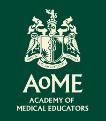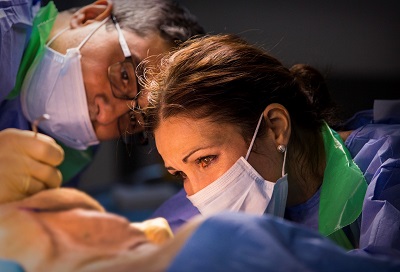Our expertise
Academic staff in the School of Medicine for Clinical Education include:
Postgraduate Director: Dr Clive Gibson (c.gibson@keele.ac.uk)
Dr Clive Gibson was appointed to the School of Medicine in 2008 and is Director of the programmes leading to the MSc in Clinical Education and Academic Staff Development. Clive as a general practitioner completed his Masters in Medical Education in 2005 worked in the West Midlands and has taught extensively both locally, nationally and internationally and published in the area of clinical education. He is currently the External Examiner for the Clinical Education programmes at the Royal College of Obstetricians and Gynaecologists and Queens University Belfast.
Deputy Programme Director, Vikki Foley (v.foley@keele.ac.uk)
Vikki Foley was appointed to the School of Medicine in 2016 as a Lecturer in Clinical Education and provides Academic support for Staff Development initiatives within the Medical School. Vikki has an NHS background where she worked in Clinical Science and has substantial experience of work based teaching and learning in clinical environments. She has several years of experience as an academic, teaching at DeMontfort University and as a Teaching and Learning specialist at Warwick Medical School before moving to Keele University. She is a Senior Fellow of the HEA and module leader for a range of modules across Postgraduate medicine courses. Vikki is actively researching in the field of Clinical Education.
Lecturer, Karl Gimblett (k.gimblett@keele.ac.uk)
Karl Gimblett was appointed as lecturer in Clinical Education in the summer of 2022 and has extensive expertise in digital education, collaborating on a number of digital projects with the NHS. Karl's research interests lie in the use of role-playing games in medical education, as well as broader interests in feedback and assessment practices, and curriculum design.
Lecturer, Dr Sheena Gibson (s.gibson@keele.ac.uk)
Sheena Gibson joined the Clinical Education team in February 2020 as a Lecturer but has been Module Lead for the Professionalism Module since 2007. She has experience in the Undergraduate Medical Programme at Keele having previously been Year 5 lead (2008-2012). She is a GP near Stafford, a Locality Lead Appraiser and a GP Trainer. In addition, she has been a RCGP examiner since 2O05, so she has a strong interest in assessment.
Her master's in medical education is from Cardiff and her dissertation looked at the “Educational needs of Primary Health care teams” and was very much focussed on interprofessional education. Since 2021 she has been Clinical Director for Staffordshire Training Hub and is responsible for provision of education and training in Primary Care for Staffordshire and Stoke.
Lecturer: Dr Abbie Meacham (a.k.meacham@keele.ac.uk)
Dr Abbie Meacham was appointed as a Lecturer in Clinical Education in 2022. She has previously taught extensively at the school in her role as a Clinical Teaching Fellow. She is a practising clinician working part time in Acute and General Medicine. Currently, she is a module lead for three modules of study within the Postgraduate Certificate and Diploma in Clinical Education programs. These modules are closely aligned to her academic and educational interests in clinical simulation, assessment practices and professional identity formation.
Lecturer: Dr Eliot Rees (e.rees@keele.ac.uk)
Eliot is a clinical academic with expertise in faculty development and medical education research. He has particular interests in selection and widening access, assessment, and leadership development. He completed his undergraduate medical training, Master's in Medical Education, and academic foundation programme at Keele University before moving to London to undertake a PhD in Medical Education at University College London (UCL). He has also recently completed a PgDip in Leadership For The Health Professions at Swansea University. He was appointed as a teaching fellow in Medical Education in 2018, and lecturer in 2019. His role predominantly involves postgraduate teaching on the MSc Clinical Education, and conducting and supporting medical education research. In addition to his role at Keele, Eliot works clinically at the Royal Free London NHS Foundation Trust and is an honorary lecturer at the Institute of Epidemiology & Health Care at UCL.
Lecturer: Dr Dominic Proctor (d.o.proctor@keele.ac.uk)
Dr Dom Proctor was appointed to the School of Medicine in 2022 as a part-time Lecturer in Clinical Education. Dom completed his MSc Clinical Education in 2019 at the University of Exeter and works as a junior doctor in London. He has experience of teaching at Undergraduate and Postgraduate level and currently leads on the 'Theoretical Perspectives on Simulation in Clinical Education' module and co-leads the 'Educational Supervision and Feedback' module.
Lecturer: Dr Gareth Byrne (g.byrne@keele.ac.uk)
Dr Gareth Byrne was appointed as a Lecturer in Clinical education in 2022. He completed his undergraduate medical degree and postgraduate training in Clinical Education at Keele University. He currently leads F2F and distance modules including ‘Effective Educational Supervision’ and ‘Simulation design and delivery’. He also works as an Anaesthetist, currently training within the Stoke School of Anaesthesia.








